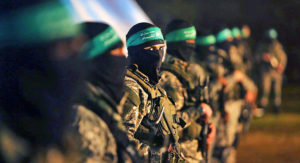Having choreographed their October 7 assault so skilfully, Hamas clearly had no plans at all for the Israeli counter-offensive. Nor did it plan for the inevitable cutting-off of Gaza’s electricity and water supplied by Israel, or consider the people who live next door to known Hamas facilities that were bound to be bombed. It didn’t even prepare its own fighters, whose anti-tank missiles were no match for the revolutionary “Trophy” active defence of Israel’s Merkava tanks and huge Namer infantry combat carriers.
When Israel’s bombing started, civilians were not allowed to shelter in Hamas’s tunnels: one of its leaders candidly explained to an interviewer that they were exclusively for the “fighters”, fatuously adding that the protection of inhabitants was the responsibility of the United Nations alone.
In past wars, Israeli offensives have been invariably swift, partly because UN ceasefires would be imposed as soon as they started winning, and partly because speed in deciding, moving and fighting is the Israeli army’s most conspicuous advantage in combat. But in Gaza, as predicted, that pace was the very first thing that the Israelis had to relinquish. Rushing into the tunnels would not drive the enemy into panicked flight. Instead, hidden sensors would trigger demolition charges, set to explode after the soldiers had advanced beyond them, trapping the troops underground.
In recent weeks, the advancing military has been forced to patiently follow the tunnel scouts of the specialised Yahalom combat engineers, who have, in turn, relied on their ultra-low frequency radar sets to detect tunnels through sand and rock, and their specially trained dogs to guide them through the dark networks. Because of this, Israeli casualties have been relatively low, while much of northern Gaza’s tunnel system has been wrecked and hundreds of Hamas fighters killed, with roughly 100 of them captured for interrogation.
It was always going to be impossible to find hostages or capture top Hamas leaders, since they were all taken into southern Gaza after the IDF’s call for the northern sector to be evacuated. As a result, the war isn’t even halfway done; only the northern tunnels have been assailed, while rockets are still being assembled and launched daily from the southern ones. But from a strictly military point of view, the war has unfolded far more successfully than seemed likely at the start, given the defenders’ inherent advantage in urban warfare and the ample ambush opportunities offered by the tunnels.
But the prudent methods that have enabled Israel’s sweep in the northern sector with a minimum of casualties come at a high political price: they prolong the war. This is excruciating for President Biden, who must keep the small but noisy pro-Palestinian progressives in his Democratic Party under control, while his diplomatic team must tend to America’s allies and friends in the Muslim world.
At the same time, however, one thing has evolved very favourably for Biden’s foreign policy team: it does not have to contend with European allies who oppose US support for Israel, as in previous wars. In 1967, for instance, the Italian government refused to allow gas masks to be sent set to Israel to cope with Egyptian gas warfare. Six years later, in fear of the Arab oil embargo, European governments would not permit US planes carrying supplies to Israel into their airspace. Things are altogether different now. Every European government that matters supports Israel, as does the European Union whose head, Ursula von der Leyen, flew to Israel early on in the war to say so.
While this greatly reduces the burden on the Biden team, there is one serious, unavoidable repercussion: Israel’s war is a terrible distraction from Ukraine’s, which is itself a huge distraction from the confrontation that really matters with the People’s Republic of China. That Biden met Xi Jinping in San Francisco last week, without the two coming to blows, may be a Good Thing, but it does not solve the problem that arises from Xi’s bellicosity.
This now manifests itself every day and in different ways. We can see it in the aggressive patrolling of Chinese aircraft and warships around Taiwan, the Philippines, Vietnam’s islands and Japan’s Senkaku islets. On land, we can also see it in the Chinese forces deployed in Tibet to threaten India’s Ladakh frontier. India is not a treaty ally, but US and Indian air, naval and ground forces train together, and the Pentagon will have to provide air support if necessary.
The existence of these other threats means that, while Israel’s ruling coalition is preparing for another month of war, Biden and his team would like an end to the fighting yesterday — or at least as soon as the Israelis hostages can be recovered. Hamas, meanwhile, is also desperate for a ceasefire; only its top leader is living it up in Qatar’s luxury, while all those in Gaza are in mortal danger.
In the negotiations, Hamas’s formula is to trade the smallest possible number of hostages for the longest possible ceasefire, with Israel’s coalition holding out for the opposite, while the Qataris go back and forth to find a compromise. As the wait continues, American and Israeli officials find themselves on opposite sides of the ceasefire question, but without any discernible acrimony. This is a matter of trust. The Israelis never fully trusted Obama, who ordered a damaging policy shift at the UN in his last days in office, but they do trust Biden. They are also impressed by Secretary of State Blinken’s steady hand on the tiller, and by the professional expertise of Secretary of Defense Austin, already well-known to them from his earlier apparition as the general commanding all US forces in the Middle East.
None of this ensures that the two sides agree on everything, but they at least do so on the things that matter. As a result, the US accepts that Hamas, with its oppressive dictatorship over Gaza and declared genocidal policy, cannot be a negotiating partner and must be destroyed like Isis. For its part, Israel’s new coalition government, unlike Netanyahu when still in sole control, accepts that US diplomacy must resume its quest for peaceful remedies for the conflict. The exemplary conduct of Israel’s Arab citizens — many of whom, from brain surgeons to mechanics, are working overtime to replace reservists — and the empathy shown by their elected leaders have taught even sceptical Israelis that coexistence could be the future. While the Gaza War shows no sign of ending soon, both Israel and America can see a way out.
Disclaimer
Some of the posts we share are controversial and we do not necessarily agree with them in the whole extend. Sometimes we agree with the content or part of it but we do not agree with the narration or language. Nevertheless we find them somehow interesting, valuable and/or informative or we share them, because we strongly believe in freedom of speech, free press and journalism. We strongly encourage you to have a critical approach to all the content, do your own research and analysis to build your own opinion.
We would be glad to have your feedback.
Source: UnHerd Read the original article here: https://unherd.com/



